Why Are They Afraid of Imran Khan?
And the forces behind his persecution
 Mehr Tarar
Mehr Tarar
 Mehr Tarar
Mehr Tarar
 |
12 May, 2023
|
12 May, 2023
/wp-content/uploads/2023/05/Pakistan1.jpg)
Imran Khan leaves a court in Lahore, February 20, 2023 (Photo: Reuters)
ON MAY 9, Imran Khan was “arrested” from the premises of the Islamabad High Court during a hearing of one of the one hundred and fifty-plus cases against him. Two days later, on May 11, Pakistan’s Supreme Court declared his arrest “illegal”and ordered his immediate release.
Dozens of Rangers, paramilitary personnel, had manhandled, pushed, and shoved Khan into an armoured vehicle on May 9, on the “order” of the National Accountability Bureau, Pakistan’s civilian apex anti-corruption organisation.
According to Salman Akram Raja, one of Pakistan’s leading lawyers—“recognised for his successful advocacy before the High Courts and the Supreme Court of Pakistan in a number of far-reaching and landmark constitutional, commercial, and corporate cases—Khan’s arrest was “completely illegal. On two grounds: one, the amendment in the NAB law elucidates quite clearly that chairman NAB is only empowered to issue a warrant when the matter is at an investigation stage. [Whereas] this matter [Khan’s case] is at the inquiry stage. The other point is even more important. It is a very old tradition, centuries-old one, in countries where a system of common law is prevalent that courts are considered a place of sanctuary. Police or any other law enforcement agency do not ever enter the premises of a court. What happened today, we witnessed the desecration of what is left of the dignity of the court in our country. Dignity of the court—be it the Supreme Court or today Islamabad High Court—is being demolished with systematic planning.”
A few hours after the arrest, peaceful protests had erupted across Pakistan. Young men and women, teenagers, middle-aged people, many of them women, Khan’s supporters, and regular Pakistanis started walking in Lahore and other major cities. The most noticeable element of these reactions was the locations at which people gathered: outside the houses of corps commanders and GHQ in Rawalpindi.
Military monuments, ubiquitous symbols of national honour and pride, were damaged or burnt in military cantonments in various cities. Residences of corps commanders in Lahore and Peshawar were ransacked and partially torched.
The Pakistan Tehreek-e-Insaf (PTI) leadership insists that it was not PTI supporters who attacked those buildings, always heavily guarded, and that it was the work of those who wish to deepen the current schism between the omniscient Establishment and the “out-of-favour” former Prime Minister Imran Khan. Some national political analysts, most of whom are generally critical of Khan’s ideology and agenda, have articulated the same possibility.
After Khan’s arrest, raids on the houses of and arrests of PTI leaders took place. President PTI Sindh chapter Ali Haider Zaidi, General Secretary Asad Omar, and former Punjab Governor Omar Sarfaraz Cheema were arrested along with hundreds of PTI workers across Pakistan. These arrests were ostensibly another action of the incumbent government to ensure the establishment of a “level playing field”—a categorical demand of the leadership of the Pakistan Muslim League-Nawaz (PML-N), especially Vice President Maryam Nawaz Sharif.
In May 2023, a coalition of fourteen parties is working on a single-point agenda: permanent removal of Imran Khan from Pakistan’s politics. Instead of learning from their past gigantic blunders of facilitating and applauding dismissals of the elected governments they opposed, they became gleeful instigators of Khan’s removal from his prime ministerial position and now from politics altogether
An anti-corruption court’s 2017 verdict disqualified Maryam to run in the 2018 general elections after she was found guilty of “aiding and abetting” her father Nawaz Sharif, three-time prime minister, “in the purchase of luxurious apartments in London that were acquired through corrupt means.” Sharif was banned from contesting elections as well as heading his own party. During Khan’s government Sharif left Pakistan in November 2019 on the pretext of a short medical treatment in London. To date, his return to Pakistan is awaited. Since April 2022, the Pakistan Democratic Movement (PDM), of which PML-N is the major player, is in power. Serving Prime Minister Shehbaz Sharif is the younger brother of Nawaz Sharif.
In an unsurprising development in October 2022, an Islamabad court overturned the 2017 corruption conviction against Maryam and her spouse. One more point gained in the process of “field levelling”.
In May 2023, a coalition of fourteen parties, most of which have been victims, enablers, and cheerleaders—in no particular order—of the unapologetic, blatant and triumphant involvement of the Establishment in the overthrowing of elected governments, dismissals of prime ministers and legitimisation of martial laws, is working on a single-point agenda: permanent removal of Imran Khan from Pakistan’s politics. Instead of learning from their past gigantic blunders of facilitating and applauding dismissals and toppling of the elected governments they opposed, they became gleeful instigators of Khan’s removal from his prime ministerial position and now from politics altogether.
Oblivious to the hard reality of power having an expiration date, the unnatural nexus of PDM and the Establishment is focused on the elimination—in more ways than one—of their common nemesis: Imran Khan. The man who was once criticised by these same parties as the Establishment’s favourite poster boy to be the upright person most deserving of being in power, and whose prime ministership they said was not because of millions of people who voted for him but solely due to the Establishment’s loving hand on his head.
All that seems to have been forgotten. Happily, unremorsefully, without a hint of shame, the PDM parties are the latest favourites of Those Who Shall Not Be Named—the real powers-that-be in Pakistan without whose backing, the rational and the realist say, no one comes into power and no one is kicked out of power.
What will be the future of PTI?
The PDM government has been trying for months to have a court label PTI a “terrorist” party, a process that will be put into high gear after the May 9 protests, some of which became violent. Protests continue in many cities of Pakistan. Unarmed people were being beaten and teargassed. The number of injured is indefinite. Reportedly, six (or more) PTI supporters, young men, have been shot dead.
The ones in power were hoping that PTI’s street protests would lose their potency after a few weeks, if not a few days. After his ouster in April 2022, Khan gained unprecedented public support, and in May 2023, he is the most popular leader in the history of Pakistan. His constitutionally mandated demand to have elections in Punjab and Khyber Pakhtunkhwa in ninety days after the dissolution of the two assemblies in January met with an adamant and a resounding NO.
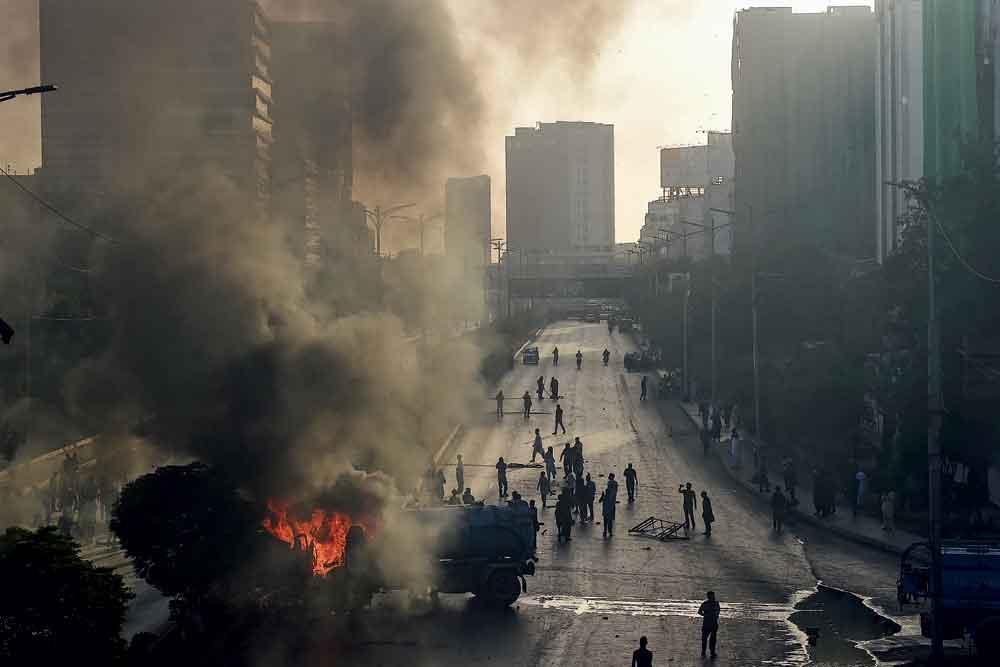
Lack of funds, unavailability of army personnel to ensure electoral security, and a new spate of terrorism were cited as reasons to not hold elections.
On May 10, Express Tribune reported: “The federal government requisitioned army troops to maintain law and order in Punjab and Khyber Pakhtunkhwa.”
Despite the Supreme Court’s ruling to hold elections in the two provinces on May 14, the incumbent government’s refusal is a flagrant repudiation of a Supreme Court order, an act of judicial insubordination not seen in Pakistan other than during military regimes.
With Khan’s arrest, Pakistan became a disturbing headline in regional and international media. Comments from a foreign politician, a former diplomat and two analysts shed an unbiased light on the events of May 9, articulating in uncanny precision the fears and concerns of millions of Pakistanis.
British politician Jeremy Corbyn
tweeted: “The arrest of former Prime Minister of Pakistan, Imran Khan, is a dark day for democracy. Solidarity with protestors in Pakistan and beyond demanding his immediate release.”
Military monuments, ubiquitous symbols of national honour and pride, were damaged. Residences of corps commanders in Lahore and Peshawar were ransacked and partially torched. The Pakistan Tehreek-e-Insaf (PTI) leadership insists that it was not PTI supporters who attacked those buildings
Former US Special Representative for Afghanistan Reconciliation Zalmay Khalilzad tweeted with the hashtags #Pakistan #ImranKhanArrest: “The arrest of Imran Khan is deplorable and will have far-ranging consequences. I condemn it in the strongest terms. It’s painful to watch a country so rich in potential, with an ancient heritage of culture, natural resources, an entrepreneurial spirit and hard-working people, repeatedly be thrown into chaos by its own dysfunctional elites—civilian and military—with some exceptions.”
Baqir Sajjad, Pakistan Fellow at the Wilson Center, Washington, tweeted: “My own assessment of the situation after speaking to some knowledgeable folks is that the situation has been deliberately allowed to deteriorate after @ImranKhanPTI’s arrest. The game plan is to manufacture an excuse to keep IK locked and impose emergency for two years.”
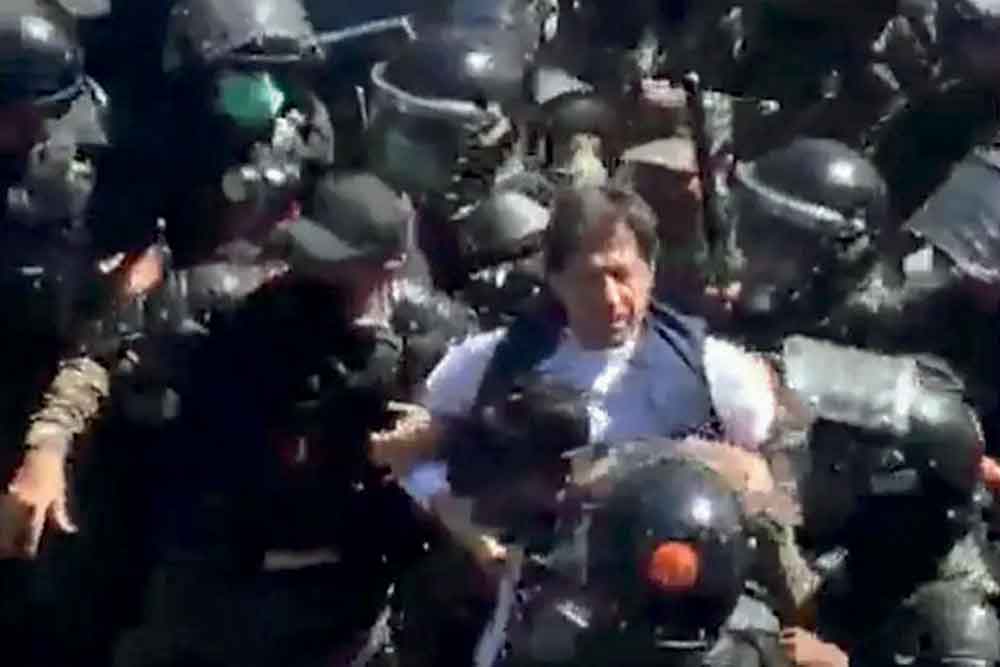
Michael Kugelman, Director of the South Asia Institute at the Wilson Center, tweeted on May 9: “Pakistan’s army may be banking on a short-lived PTI protest movement that peters out after a few weeks, with no party leader w/Khan’s charisma and clout capable of leading a sustained movement. Questionable bet to make against supporters of the country’s most popular politician… In Pakistan right now, public fury is being directed at the Army on levels that haven’t been seen in a very long time. The images today of people storming and burning military property would have been unthinkable a few years ago. Such dramatic changes over so little time…”
After Imran Khan’s arrest, raids on the houses of and arrests of PTI leaders took place. These arrests were another action of the incumbent government to ensure the establishment of a ‘level playing field’—a categorical demand of the leadership of the Pakistan Muslim League-Nawaz (PML-N)
Kugelman tweeted on May 10: “Pakistan today may face its biggest threat to public order since the end of formal military rule 15 years ago. But the military is the target of more public anger than it has been at any time since then. So a takeover seems unlikely; the hybrid regime model will likely persevere. If—a big if—protests simmer down after enough steam has been blown off, the continuation of the latter is even more likely. But then again if there’s a plan to stir up as much unrest as possible and use that as a pretext to postpone elections, who knows what could happen next… Some weeks back, senior Pakistani officials described PTI as ‘miscreants trained by banned organizations’. Today, more top party leaders were arrested. Looks like the plan may be to disqualify Khan, take the leadership out of the picture, and even ban the party on the whole.”
The terrifying truth of what happened in Pakistan on May 9 is encapsulated in this tweet of Hussain Nadim, former executive director of the Islamabad Policy Research Institute: “Between elections and civil war they have chosen civil war. What a sad day for Pakistan and what a shameful conduct by the government—expected no less from them. #ImranKhanArrest”.

/wp-content/uploads/2025/07/Cover_Dalai-Lama.jpg)






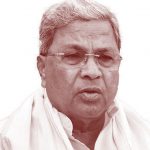

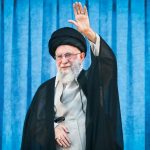

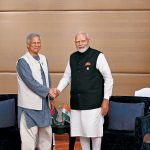

More Columns
From Entertainment to Baiting Scammers, The Journey of Two YouTubers Madhavankutty Pillai
Siddaramaiah Suggests Vaccine Link in Hassan Deaths, Scientists Push Back Open
‘We build from scratch according to our clients’ requirements and that is the true sense of Make-in-India which we are trying to follow’ Moinak Mitra